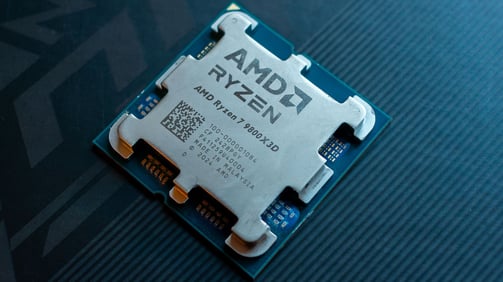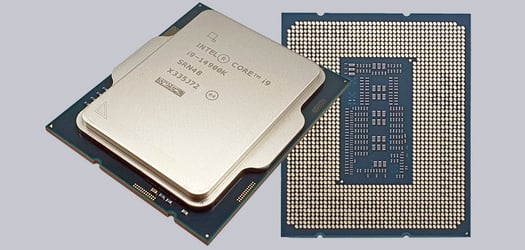In the ever-evolving landscape of gaming CPUs, two titans emerge: Intel's i9-14900K and AMD's Ryzen 7 9800X3D. Both processors promise top-tier performance, but which one truly reigns supreme for gamers? This article delves deep into their specifications, gaming benchmarks, value propositions, and ideal user profiles to guide you in making an informed decision.
Specifications Overview:
Intel Core i9-14900K
Architecture: Raptor Lake Refresh
Cores/Threads: 24 (8 Performance + 16 Efficiency) / 32 Threads
Base Clock: 3.2 GHz (P-Cores)
Boost Clock: Up to 6.0 GHz
Cache: 36MB L3
TDP: 125W (Base), 253W (Boost)
Integrated Graphics: Intel UHD 770
AMD Ryzen 7 9800X3D
Architecture: Zen 5 with 3D V-Cache
Cores/Threads: 8 / 16 Threads
Base Clock: 4.7 GHz
Boost Clock: Up to 5.2 GHz
Cache: 96MB L3 (with 3D V-Cache)
TDP: 120W
Integrated Graphics: None
Gaming Performance
Intel Core i9-14900K
The i9-14900K showcases impressive single-threaded performance, making it a formidable choice for gaming. Intel's Application Optimization (APO) technology offers game-specific enhancements, yielding up to 16% performance boosts in titles like "Metro Exodus" . However, it's worth noting that in several gaming benchmarks, the i9-14900K is outperformed by AMD's offerings, particularly in titles optimized for AMD's architecture.
AMD Ryzen 7 9800X3D
AMD's Ryzen 7 9800X3D, equipped with 3D V-Cache technology, delivers exceptional gaming performance. Benchmarks indicate that it often surpasses the i9-14900K in gaming scenarios, thanks to its massive L3 cache and efficient architecture . This processor shines in gaming environments, offering consistent frame rates and smooth gameplay experiences. The Ryzen 7 9800X3D is something to definitely consider for your gaming rig.
Productivity and Multitasking
Intel Core i9-14900K
With its higher core and thread count, the i9-14900K excels in multitasking and productivity workloads. Tasks such as video editing, 3D rendering, and software compilation benefit from its robust performance capabilities.
AMD Ryzen 7 9800X3D
While primarily designed for gaming, the 9800X3D still offers commendable performance in productivity tasks. However, its 8-core configuration may not match the multitasking prowess of the i9-14900K in heavily threaded applications.
Thermal Performance and Power Consumption
Intel Core i9-14900K
The i9-14900K's high performance comes with increased power consumption and heat generation. Under load, it can draw up to 253W, necessitating robust cooling solutions to maintain optimal temperatures .
AMD Ryzen 7 9800X3D
In contrast, the 9800X3D operates more efficiently, with a TDP of 120W. Its design ensures lower thermal output, making it suitable for builds where heat management is a concern
Value for Money
Priced at approximately $575, the Ryzen 7 9800X3D offers top-tier performance but at a premium. The intel i9-14900K, retailing around $445, provides exceptional gaming performance at a more accessible price point. For gamers focused solely on gaming, the 9800X3D presents a better value proposition for your gaming rig, as it is just $100 more.
Ideal User Profiles
Intel Core i9-14900K
Target Users: Content creators, streamers, and professionals requiring high multitasking capabilities.
Use Cases: Video editing, 3D rendering, software development, and gaming.
AMD Ryzen 7 9800X3D
Target Users: Dedicated gamers seeking optimal performance in gaming scenarios.
Use Cases: High-FPS gaming, esports, and gaming at high resolutions.
Compatibility and Platform Considerations
Intel Core i9-14900K
Compatible with LGA 1700 socket motherboards, including Z690 and Z790 chipsets. Offers support for both DDR4 and DDR5 memory, providing flexibility in build configurations.
AMD Ryzen 7 9800X3D
Requires AM5 socket motherboards and supports DDR5 memory exclusively. While the platform is newer, it ensures future-proofing for upcoming AMD processors.
Overclocking Capabilities
Intel Core i9-14900K
Offers robust overclocking potential, allowing enthusiasts to push performance boundaries further. However, effective cooling solutions are essential to manage the increased thermal output.
AMD Ryzen 7 9800X3D
The 9800X3D supports overclocking, but the benefits are more limited compared to Intel's offerings. Its design focuses on out-of-the-box gaming performance rather than extensive overclocking headroom.
Future-Proofing and Upgrade Paths
Intel Core i9-14900K
As part of the 14th Gen lineup, it's compatible with existing 600 and 700 series motherboards. However, future Intel CPU generations may require new sockets, potentially limiting upgrade paths.Beebom+1Lifewire+1
AMD Ryzen 7 9800X3D
Built on the AM5 platform, AMD has committed to supporting this socket for multiple future generations, offering a more extended upgrade path for users.
Frequently asked questions
Which CPU offers better gaming performance?
The Ryzen 7 9800X3D




